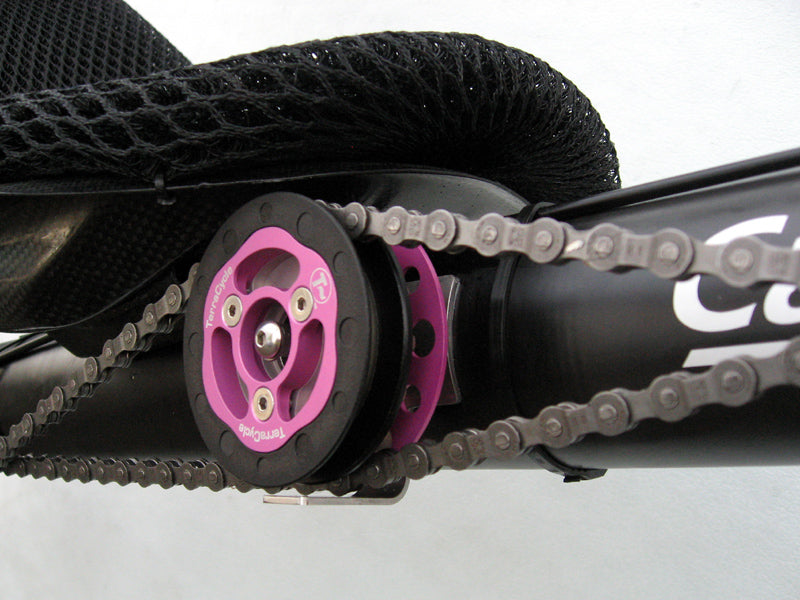
Drivetrain Noise
Pat FranzThere are lots of possible sources of chain noise. Pretty much everything that touches the chain can be a source of noise, so you have to be methodical about figuring things out. With experience, you can tell a chain rubbing noise from a bearing noise from a misaligned derailleur, but it takes practice with each problem to get there.
A good first place to start diagnosing is whether the noise gets louder when you pedal harder. If so, the noise is probably on the drive side. If the noise stays the same, it's probably on the non drive side. Listen to hear if the sound goes in time with the cranks or the rear wheel. If it does, that's a good clue.
A good next test is to shift through all the gears and listen. This may or may not make the source clear- there are lots of different things that change when you shift. But, in combination with the pedal harder test, it can be a good source of information.
If the sound seems to be on the drive side, check the idlers and chainline on the drive side. Check for rubbing on chainkeepers, frame members, cables, etc. Check to make sure the chain isn't derailed off the idlers, or drooped down and snagging on something.
If the sound is dull, look for rubbing on soft or plastic things. If the sound is sharper, look for rubbing on hard or metal things. Chaintubes have a characteristic sound; you can easily check for it by moving the chaintube around as you pedal.
Check any idlers for signs of significant wear or bearing failure. Bearings generally make fairly sharp sounds, but sometimes make rumbling sounds. Worn chainbeds on non toothed idlers tend to make a rumbling sound. Worn cogs are hard to diagnose by sound, they generally get quieter as they finally wear out. Cog wear is pretty obvious visually, they usually wear sideways (teeth get thinner). They eventually wear out radially as well but there isn't much sound associated with that. If anything looks torn up, it could be causing noise.
Ideally, the chainline should be straight or nearly straight from side to side as the chain comes off the top of the cassette and goes to the chainring. If anything is deflecting the drive side chainline sideways (chaintubes, idlers), it may be a source of noise. If the cranks aren't lined up straight (boom twist) you can get some interesting noises.
It is shockingly common for idler mounts to push idlers out enough to significantly deflect the drive side chain when you're in the low gears. If your noise is only in the low gears, be sure to check for this. If you can do anything to let the idler get in closer to the frame (remove spacers, chainkeepers, jam nuts, etc. you might try that temporarily and see if there is an improvement. We always recommend you let your power side idlers float from side to side as much as possible. The closer the idlers are to the ends of the drivetrain, the more important this is. It's good to float return idlers as well, but it's less important because the chain forces are so much lower there.
If the noise seems to be drive side related, and the noise decreases when you go to the big chainring, check the amount of vertical chain deflection (chain wrap) at the idler. It would seem to make sense that less chain deflection would be quieter, but the opposite is actually true. Many chainlines are set up with too little vertical deflection at the idlers. As the amount of deflection increases (shifting to the big ring usually does this), idlers often get quieter. It has to do with the radius of the idler and the way the link nature of the chain approximates the arc of the bend. Larger idlers need less chain deflection or chain wrap to be quiet than small ones. If your chainline is on the edge, you will get a thrumming type noise that will decrease, sometimes sharply, as you shift into gear combinations with more wrap.
Bent or misaligned idler shafts will also cause noises. Both up/down and forward/back misalignments will cause noise. If you have a trike with a low idler, be sure and check for this. It's easy to bump something and bend things a bit. Sometimes, the idler mount will deform in regular use, but that's rare. It's possible the idler mounts aren't straight from the factory, but that's rare too.
If the noise doesn't seem to be drive side related, check for any rubbing along the return chainline. Again, chaintubes, chainkeepers, cables, anything that touches the chain. Rear deraileurs tend to make noise that doesn't vary with chain tension, so check to make sure the hanger and deraileur aren't bent (the hanger and pulley cage should both be vertical when viewed from the back). Check the indexing by looking at the chain coming off the top deraileur pulley and going up to the cassette cog- it should be vertical and not angled. Check the float on the upper pulley, it should go side to side a bit to allow the cog to control the chainline.
The chain can usually rub on the sidewall of a return idler without making much noise at all. Newer chains have recessed pins and just the plates rubbing doesn't usually make audible noise. It makes some noise of course, but usually there are so many other, louder noises (tires, etc.) that you never notice it. If the return idler is deflecting the chain sideways, it's usually worth it to move it or allow it to float.
If you have chaintubes, alignment is very important. Allowing the chaintube to move with the chain (more to cover it than to control it) helps a lot. The entry and exit shape of the chaintube makes a big difference- you don't want just a square cut edge, you want flaring. Chaintube material is important. Hard materials are louder than softer materials. If you can tap the chaintube with a wrench and get more than a dull sound, you should look for a quieter material. And finally, length makes a difference. Longer tubes make more slithering noise, of course, but on the drive side, you can get a buzzing sound as the chain tightens on every pedal stroke. The longer the tube, the more the buzzing sound.
We hope these tips and techniques will help you diagnose what's going on with your bike or trike. As always, if you have any questions about drivetrains, drivetrain performance, or drivetrain noises, email us and let us know. We're pretty good about being able to help figure things out.
